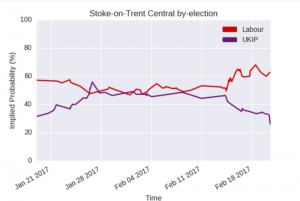Politics explained with Stoke and Copeland as exemplars
The biggest tragic joke in (world?) politics last week wasn’t the news that Germans, when polled, indicated that they would replace Angela Merkel with Martin Schulz. No, it was how an apparently pro-Brexit electorate voted for two anti-Brexit parties in two by-elections; and specifically, it was how people who had previously voted UKIP in 2015 abandoned the party to vote Tory. The reference is to the Copeland contest where Fiona Mills suffered an indignity that should never happen to a UKIP candidate. On the other hand, UKIP leader, Paul Nuttall, merely suffered the usual concerted Establishment conniving so that Labour, who it was so important to have the Tories beat in Copeland, would survive in Stoke to continue to play its vital role in the grander scheme. The results do not accidently reinforce a narrative that UKIP – the party of Brexit – is unelectable and the Tories are the party of Brexit. In fact, it would not surprise the author if the scenario had been planned out by someone deep in the inner workings of the British Government.
If the reader doesn’t know, the British Government controls both sides of the political spectrum – that’s how it ensures it gets what it wants. Be clear, when referring to the British Government, we’re not talking about any particular party in office. We’re talking about the Deep State, the real government in the shadows (in the author’s opinion, the boys from the same old families who are initiated at the same old schools as their Victorian predecessors were – the same who had been royally irked by Georgian social mobility enough to put an end to it forever). The dark government rules the country (or manages it as a fiefdom) by puppeteering political parties and corporate-media on behalf of themselves and others we are only half aware of through the little knowledge we have of organisations such as the Bilderberg Group (we really aren’t supposed to know about the Bilderberg Group). The one thing that the British Government can’t seem to control has been the rise of a real opposition in the form of UKIP (this judgement made by the volume of disruption levelled at it) and that’s why that party is the victim of everything from outright cheating (see the Thanet South election – covered in this FBEL article), to honey trap operations, to Tory infiltration to disarm the party by appealing to the Establishment-wannabee contingent (and Tory infiltration to pull it from the other side), but more usually regularly gets subjected to Nazi-level propaganda (from media that UKIP people will insist on paying for), not only to shut the party out of Parliament, but to give people the impression that it is perpetually on its dying feet.
In the current political landscape that the British Government has created going forward to the 2020 election, nothing has changed. It is structured to make sure that the Deep State doesn’t lose power. The pressure that was building up about EU membership, and driving increasing UKIP popularity, has been released somewhat by the valve of the referendum and the Tories appearing to be delivering on it (the Tories are delivering a faux-Brexit – see here). Labour’s part in the scheme is to represent a threat to the Tories’ “successful accomplishment” of “Brexit”, so that people will be panicked into voting Tory when it looks like Labour may intrude. As such, Labour can’t be replaced in a wholesale way by UKIP – who would only re-introduce pressure for a properly executed departure from the EU. And so, Jeremy Corbyn is for two purposes. Firstly, he appeals to people who have voted Labour and who detect the dead hand of the British Government of and for corporate globalism. These people think that Corbyn is an anti-Establishment revolutionary – a reaction to the Blair corporatism – rather than the Government tool he clearly is. Corbyn demonstrated a disqualifying lack of integrity when he discarded, what we were told were, deeply-held personal convictions regarding opposition to the EU, to oversee an official Labour Remain stance during the referendum on EU membership. But in spite of this, the hoodwink suffers not, and so certain Labour voters won’t abandon the Labour party for UKIP because of Corbyn. On the other hand, Corbyn is the bogeyman that drives would-be UKIP voters to the Tories; the motivation is panic brought on by fear that a party with his demonised-self would rule the country. It’s an age old tactic. And it explains why his leadership receives such a lot of disruption from a wing of the Establishment itself – all part of the ploy to paint him like a latter-day Michael Foot. Lots of people in UKIP mistakenly believe that Corbyn is a boon for their party. The Copeland by-election should put that misconception to bed forever.
In Copeland, more people voted for UKIP amongst a bigger turnout in 2015 than they did at this recent by-election. Without a doubt, at this by-election, one-time UKIP voters turned out for the Tories. This is incredibly unpalatable news for the author, who thought that people who turned to UKIP understood the futility of voting for any element of the LibLabCon. The message to them in their folly is this: the Tories will never return the favour, and didn’t at Stoke. The major problem with UKIP’s Copeland election campaign, as far as the author could see, was that it was focussed on “beating” Labour, or answering false charges that Labour had levelled at UKIP (the Stoke operation looks, by certain accounts, like it was hamstrung by this specific aspect too), so that “we heart NHS” appears to have been a primary campaign slogan. In the end, surely the only thing that UKIP did effectively in Copeland was motivate people to vote Tory, and the Tories certainly didn’t need any help to beat Labour when the local press, ultimately run by Tory peer and alleged trougher Baron Inglewood, wouldn’t feature UKIP in election coverage (as the UKIP candidate rightly complained about during the campaign).
In Copeland, UKIP should have focussed on beating the Tories. It didn’t matter if Labour won the seat from an incumbent position. A message needed to be sent to the Establishment that the wool isn’t being pulled over eyes, and it won’t get to engineer things the way it wants to. For UKIP, that election, and every election to come, should be about exposing Fake Brexit. Only a matter of hours before polling day in Copeland, David Davies – the actual minister for Brexit – told Estonian press that immigration from Eastern Europe would continue for years (source). What he was doing was ressuring foreigners that their British Milch Cow was not about to dry up – and it was an outright disgrace. The one real duty of Government is to protect its own people – not encourage their continued economic displacement. So there was not, and there certainly will not be any shortage of material for UKIP to campaign on.
In being radical, as many people think the party should be (and as it must), UKIP should be exposing the exact nature of the Establishment stitch-up through topical issues such as Fake News as psychological warfare on Britons, vaccine safety (the link between vaccines and brain damage and other illness) as an example of welfare state health provision as exploitation, not as salvation, and immigration as colonisation by a foreign power (the EU, for Globalism, and so ultimately, perversely, for the UK Deep State) and as economic warfare on Britons (an FBEL article on that subject here). All of these are expressions of the same thing: the Globalist hegemony through collectivism, slavery and annihilation – to the detriment of the national & individual good and general wealth. In taking these issues on, and courting the controversy that goes with them, UKIP will be broaching what one could call the political occult – that which is hidden – and this is a profound point of weakness for people who really do believe that power lies in the ability to hoodwink.
The Stoke by-election could be a case in point (and Snell, the Labour candidate for Stoke, being a Fabian – itself a creation of those abovementioned Victorians – may well have an insiders’ appreciation of the political occult). First of all, it needs to be recorded that the Labour party openly resorted to deception by trying to appear to the electorate in the guise of UKIP itself – as reported by Arron Banks. At a deeper level of trickery was a clearly visible element of psychological operation – that is, a grand deceit to weaken UKIP. To be precise, one could see two parts of a classic three-part exercise. Firstly, approaching election day, the media assault on the UKIP leader was as tremendous as it was malicious – as explained in a previous FBEL article. And then, after the election, corporate-media pundits were quick to promote the idea that such was Nuttall’s failure that his continued leadership of the party must be in question. An article by pea-brained “pundit” Katie Hopkins was particularly appalling, and took the Nuttall-future meme bluntly to a “UKIP is dead” conclusion. (Before this incident, the author thought that she was a gatekeeper at the edges of real controversy – a particularly loud valve to let off steam on behalf of an audience that is, as usual in the UK, comprehensively duped).
So, we could say that two features of a highly disruptive psyop were quite visible. If they were conceived that way by British Government thinkers, and organised to bookend each other (rather than being organic – and arguably the build-up was too vicious for this, and even Paul Nuttall described it as being coordinated), then, given that the failure in the middle was absolutely necessary for any of it to work, it would suggest that Nuttall’s failure had to be assured – and that would mean cheating in the election.
As it happens, Stoke very well could have previous – as explained here. In the 2015 General Election, in the Stoke South contest, the Tory candidate was all set to win when extra ballot papers – in their thousands – were discovered and brought late to the count. Two ballot boxes had been marked up as being of another constituency, and postal ballots were also introduced at the last moment to give the Labour candidate a victory – by roughly the same amount that Snell beat Nuttall by, incidentally. Of course, we can’t say that this was proof of cheating, but the author, from his study of 2015 GE shenanigans, discovered that it almost definitely happened in other places (to the point of certainty, to be frank), and the purpose would have been to give the Tories a clear majority in the Commons to avoid a Tory-Labour “Grand Coalition” that the Establishment had obviously been very concerned about avoiding.
Generally, the author was interested to see a chart showing betting on the Stoke Central by-election, and it’s a feature of the scurrilous human being’s behaviour that inside knowledge will translate into an attempt to make money. Support for UKIP fell off dramatically at about February 14th. The Establishment had been active in its Alinskyesque assault on Nuttall for a number of weeks prior to this, and apparently it had produced no dramatic effect in terms of betting on the outcome.
All that being said, if there is no evidence of physical cheating (as opposed to psychological cheating, which there was plenty of) despite us knowing about precedent, then there’s no reason to say, or even suggest that it did happen. While the Establishment has such inertia and will be difficult to overthrow, the losses at Stoke and Copeland were down to a failure to work up enough power behind a rush and push. UKIP has to be yet more doughty, and it starts with finally fixing its internal problem of what the author describes as Establishment-membership wish complex – something that comes out of a notion in certain parts of UKIP which won’t or can’t see fundamental injustice to oppose it, but instead wants to cosy up to it and procreate with it to beget that nasty parasitical, non-producing thing that is a political career.



















